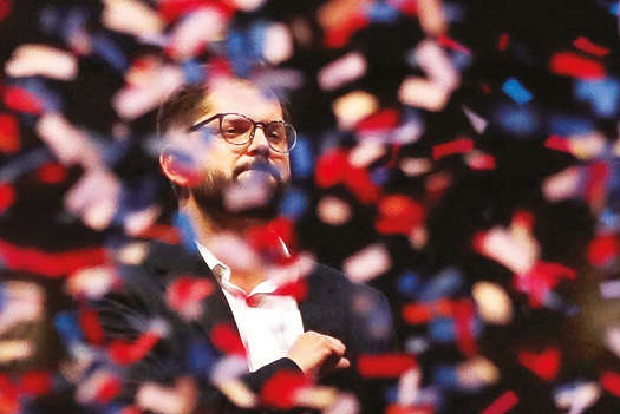Begin typing your search...
Do-or-die moment for an incoming president
Today, hope triumphed over fear,” declared Chile’s new president-elect, Gabriel Boric, a leftist lawmaker and former student activist, in a speech Sunday celebrating his victory over far-right rival José Antonio Kast.

Chennai
The refrain took on a life of its own, and all week Chileans, on social media and on the streets, repeated it, if only to serve as a reminder that fear-mongering and polarisation should have no place in electoral politics.
But hope alone will only get Boric so far. The 35-year-old leader immediately faces the challenge of helping those struggling in a Covid economy, including older Chileans crushed by meagre or no pension benefits. But the biggest test of his presidency, the one that will not only cement his place in Chilean history but define society in a post-dictatorship nation, will be his leadership ahead of a referendum next year on a new Constitution that would enshrine rights and values for a more equal, inclusive nation and break with the charter birthed under Augusto Pinochet.
In 2020, Chileans voted overwhelmingly to leave the old text behind, and less than a year later, they selected 155 drafters to write the new one. But weariness from the pandemic, funding controversies, and frictions over procedure and substance inside the constitutional convention — the body tasked with drafting the charter — could easily erode its public support. And if those are the challenges now, there’s no telling what challenges lie ahead once the framers approve the text of the new Constitution and it is up to the citizenry to debate and ratify it. A torrent of fake news around the constitutional process shows that bad actors are hard at work seeking to delegitimise it.
Any misstep in the process could undermine the credibility of a new Constitution — and provide fodder for supporters of the old order, including figures like Kast, to rally around rejecting it. This is do-or-die for Boric. With history as a guide, Boric starts off with reason to hope that Chilean society, at a pivotal moment for its democratic project, will choose wisely. Boric was only 2 years old when Chileans, in a historic plebiscite in 1988, rejected the military rule of Pinochet, setting Chile on a path to democracy and self-determination. Then, nearly 56 percent of voters said no to the dictator’s brutal regime, opening the door to a modern era of democracy and institutional growing pains.
More than 30 years later, by a similar margin, Boric’s message of hope and change prevailed over Kast’s dire warnings that Chile was on the precipice of abandoning this political and economic model, and descending into Communism. Fifty-six percent of the Chilean electorate rejected that message and voted for Boric, making him the youngest president to reach La Moneda, Chile’s presidential palace, and the candidate to receive the highest number of votes in a presidential contest in the nation’s history. Turnout likewise shattered records. Boric’s mandate is clear.
Yet the president-elect, for all his youthful energy and commitment to dignity, equality and the internment of neo-liberalism, is keenly aware he’ll need more than just rhetoric to govern and make a reality the social promises that propelled him to power. In his acceptance speech, Boric was candid in his assessment that the future of his campaign promises — among them access to quality health care for all and overhauling Chile’s privatised pension system — will require consensus, meeting others in the middle, and taking “short but steady steps” in the face of a closely divided national Congress. His greatest challenge, beyond making it past his honeymoon with voters and responding to specific demands, will be to show that he’s the president of not just the here and now, but also of Chile’s imminent next founding — the first chief executive who’ll chart the nation’s future course based on the first charter ever written by Chileans themselves.
Farias is a journalist who writes about law, justice, and politics
The New York Times
Visit news.dtnext.in to explore our interactive epaper!
Download the DT Next app for more exciting features!
Click here for iOS
Click here for Android
Next Story



